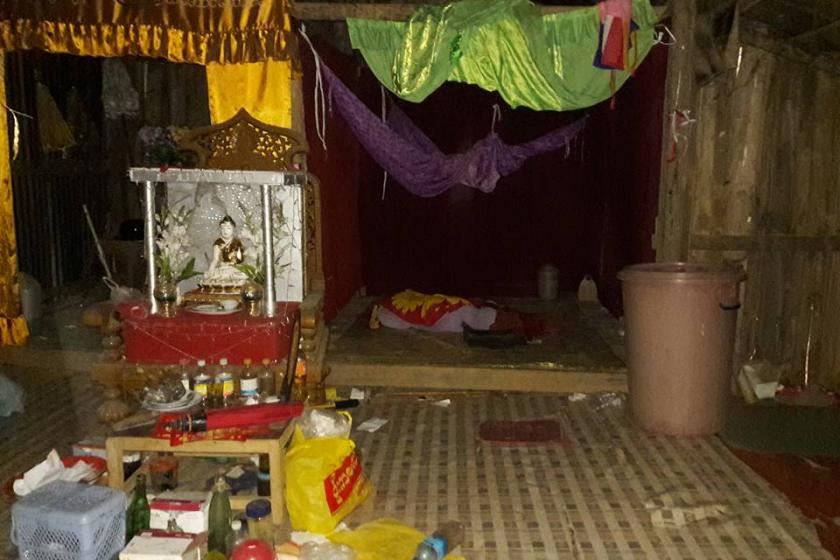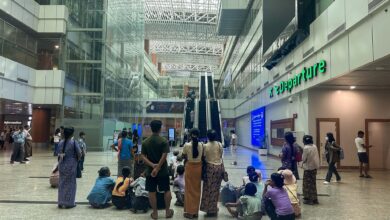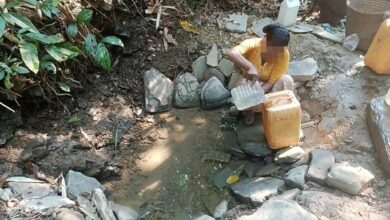
PATHEIN — In a house by the road leading to Ngwe Saung beach in Ayeyarwady Region, a village administrator was chatting heatedly with a group of women. A ten-year-old girl sat close by, playing with rubber bands.
They were discussing the repeated rape of four female elementary school students, including a ten-year-old girl, over several months while staying at a Buddhist monastery presided over by a lone monk.
The parents, who live a mile from Saitta Thuka monastery, had assumed their children returned to the monastery after school each day to help with chores, do their homework, and rest for the night. Their abuse was revealed a few days after they returned home for the hot season holiday in February.
The mother of the ten-year-old girl said that she was so furious she thought about running straight to the monastery.
“If he were an ordinary man, I would have knifed him on that day. But, I couldn’t do it because he was a monk,” she said.
Parents say the monk, U Nanda Thiri, took advantage of local families’ poverty and lack of education.
Struggling to get by
The ten-year-old girl is the eldest of five siblings. The mile-long road from her home to the school is too steep for cycling, and with a daily income for the family of only a few thousands kyats, motorcycle taxis are too expensive.
So, when the monk offered to take the girl in, the parents gladly accepted.
The family home is a hut of 10 square feet with a poorly thatched roof in Yetho village, 19 miles from Pathein, the regional capital. Like many locals, the parents do multiple jobs, including chopping wood and making charcoal—hard work for low pay. On a good day, they can enjoy a fish curry.
Another rape survivor, aged 12, is also from Yetho. In a family of four, her home looks better than others in the village, but the family also has to struggle to get by.
Two other rape survivors are sisters aged 10 and 14 from Ma Daut Kone village, a mile from Yetho. The family’s daily income is 3-5000 kyats, so they cannot afford for the girls to go to school.
The parents knew and trusted the monk, who promised to pay the girls’ school fees.
The monastery is a 20-square-foot wooden building on two acres of land near Yetho Creek. The monk sleeps in a separate room known as kyat-tha-ye-khan, which is also used to store food and donations. It is close to where the girls sleep. Boys, including novices, sleep further away.
The girls described the kyat-tha-ye-khan as a “hell room.”
Daytime assaults
The rapes started a week after the school year began in June 2017. The monk would command two or three children to massage him with the order, “soldiers, massage!” The victim would be the last one left in the room with the monk, the girls said.
The daytime assaults usually happened while the boys were playing outside, the ten-year-old girl said.
“When the boys tried to come inside, the monk stopped them, saying their feet were sandy. He asked them to cook rice or fetch water, but kept the one he wanted to rape with him,” she said.
He would ask another child to keep watch while he raped, threatening to beat them if they told their parents. He did not use a condom, the children said.
“The monk’s face was sweaty. He said nothing when I asked what he was doing. He raped me without taking off his thin paing [an undergarment worn by monks],” the 14-year-old girl said, crying, her arms around her knees.
The girl said she bled from her private parts, and was in considerable pain.
“Sometimes I couldn’t walk. My feet were stiff,” she said, looking down.
She did not tell anyone, including her classmates, about the assault for the whole school year. Her ten-year-old sister was also assaulted, she said, declining to answer further questions.
The 14-year-old girl, the oldest of those known to have been raped, has shown no signs of pregnancy, her father said.
“The children are young enough to be his grandchildren,” he said.
The 14-year-old girl has avoided eye contact with people ever since, the elder sister said.
“She looked so downcast when she came back for the school holiday. We thought it was because she was going through puberty,” she said.
The other two rape survivors could not be reached for interview during Myanmar Now’s visit.
However, one of the boys who stayed in the monastery told Myanmar Now he knew nothing about the rapes.
According to village administrator U Saw Win, there were a total of 11 boys and girls staying at the monastery. It is now empty and village elders have locked up the compound.
Who is U Nanda Thiri?
Locals estimated the monk Nanda Thiri had been living in Yetho for about 10 years, though they didn’t know his origins.
He was ordained as a monk at Saitta Thuka monastery three years after his arrival in the village. When the abbot passed away five years ago, he became administrator of the monastery, which received less food and fewer donations under his charge, locals said.
Police records seen by Myanmar Now attribute various names to the monk—Nanda Thiri, Lu Lay, and Khin Maung Oo—and put his age at 56. Orders have been sent to police stations around Pathein, as well as others in Yangon and Sagaing regions, to arrest the monk on sight.
Police officers said they could not answer questions on Nanda Thiri while the investigation was in progress.
The monastery receives steady income from a telecom tower within its grounds, as well as 1 million kyats in donations each year from the Kathein festival in Ngwe Saung, said U Hla Aye, a local who was a monk at the monastery for two years
Because Nanda Thiri holds a license to practice traditional medicine, locals and people from elsewhere would come to him for consultations.
Hla Aye said he saw Nanda Thiri abusing the girls a few days after their arrival at the monastery, and he tried to reprimand the monk.
“He was rubbing the two children’s nipples with his hands. I told him he shouldn’t act like this, and he said it was none of my business,” Hla Aye said. Later, Nanda Thiri asked him to move to another monastery, which prompted Hla Aye to leave the monkhood.
“He knew if I stayed in the monastery, his devious acts would be exposed,” Hla Aye said.
Nanda Thiri gave each child 200 kyats per day as pocket money, but sometimes gave anywhere between 1,000 and 20,000 kyats, the rape survivors said. The parents and village elders said they knew of this.
Fugitive monk
After the children returned home in February for the holiday, having done their exams, Nanda Thiri came to the village and approached the mother of the ten-year-old. He said he missed the children, and requested the mother to send her daughter to help with chores at the monastery.
When the mother asked her daughter to do so, the daughter revealed what she had suffered.
“I told everything because I was afraid of going back,” the ten-year-old told Myanmar Now.
That same morning, the mother went to enquire with the parents of the other girls. They discussed the alleged rapes for the rest of the day, and went with the village administrator to the Tha Lat Kwar police station around midnight.
Nanda Thiri had left by this time and was staying at another monastery called Tha Lat Kwar. The monastery’s abbot U Kawwida told Myanmar Now that Nanda Thiri departed the next morning, saying he would go to Pathein, and has not been seen since.
Kawwida said he had thought Nanda Thiri was merely being charitable by taking in the children. He promised to tell the police if he heard any news of Nanda Thiri, saying the allegations could give “anti-monk” activists a reason to attack the sangha, as the Buddhist monkhood is known.
“The sangha is now being attacked from all sides. Since this is a real case of child abuse, I will inform as soon as I hear anything,” Kawwida said.
Colonel Khin Maung Lat of Ayeyarwady Region police said the force was trying to arrest the accused.
“If we still have no news of him after four or five months, we will charge him as a fugitive,” the police colonel said.
Police said the children were sent to Pathein General Hospital for checkups two days after the case was filed.
Never again
Although the children are relieved they no longer have to stay at the monastery, they remain shaken.
If the ten-year-old girl had not revealed the assaults, they would have continued, U Ko Lat, a representative for ten local households, told Myanmar Now.
There are people in the community who praise her courage, the girl said, but there are some who blame her,
“When I passed by a neighbor’s house yesterday, the neighbor asked why the ‘monk’s wife’ was walking in front of their house,” said the girl, wiping tears from her face.
“My friends say nothing but their grandmothers talk, and they don’t allow their grandchildren to play with me. I don’t want to tell my mother. She would pick a fight with them,” she said.
The father of the 14-year-old rape survivor said the parents were hoping for a harsh punishment for the rapist. However, he said the community’s lack of education had helped enable the assaults.
“I will not let this happen again. It doesn’t matter how tired I am, I will make sure my kids are educated,” he said.
The children said they enjoy going to school.
“I will continue my education. I have never failed an exam. I will be a teacher after I graduate,” the ten-year-old girl said.
According to police data for 2017, Yangon Region has the highest number of sexual assaults in Myanmar, followed by Ayeyarwady Region, where 243 rape cases were reported to police. The victims in 156 cases were children.
Many of the child rape survivors share a similarity in having many siblings. Financially stretched parents are unable to look after all their children themselves, and so leave them in the care of others.
Daw Khin Lay, director of the Triangle Women Support Group, said poverty is the main reason why children have to suffer these abuses.
She said some orphanages and charitable organizations take in children to attract donations, but they don’t look after the children properly, and there have been instances where the children are sexually abused by staff.
Local authorities should learn from the case of the four schoolgirls in Yetho village, and they should audit shelters caring for underage children, she said.
“If we had a regular audit system, the physical and emotional abuse of children would be reduced,” she said.
Editing by Ben Dunant



